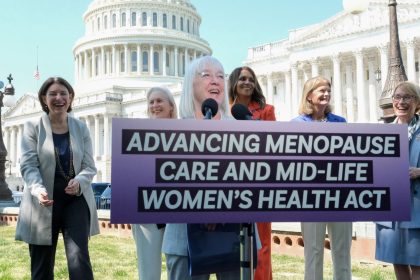Emergency Approval of Coronavirus Vaccines is Not Guaranteed, FDA Commissioner Says

WASHINGTON — The Food and Drug Administration will not automatically authorize emergency use of coronavirus vaccines before completing a rigorous independent review, despite heightened expectations that two vaccine candidates will be available to Americans this month, Dr. Stephen Hahn, FDA commissioner, told McClatchy in an interview Tuesday.
The interview came hours before Hahn met with White House chief of staff Mark Meadows, according to an administration official, amid calls from President Donald Trump for the FDA to “act quickly” in the approval process.
The FDA is entering one of the most consequential periods in its history after two companies, Pfizer and Moderna, submitted requests for authorization of emergency use of their COVID-19 vaccine candidates. Public advisory meetings have been scheduled, and FDA scientists are reviewing internal company data “around the clock” preparing to deny or approve the applications within a matter of weeks, Hahn said.
“The urgency of the situation is a pressure that I think is substantial on all of us,” he said in the phone interview. “Our career staff recognize that and are working with great speed. But also we’ve maintained a commitment to using data and science, and we will continue to do that.”
Their reviews will not be based on public statements from the companies that say both vaccine candidates, which use similar biological platforms, demonstrated up to 95% effectiveness in advanced clinical trials.
Company results will have to be independently verified, and their safety profiles will be rigorously vetted despite company assurances that the FDA’s safety data milestones have been achieved, Hahn said.
The prospect of imminent vaccines has provided a light at the end of a dark tunnel to Americans facing uncontrolled spread of the pandemic disease and record cases, hospitalizations and deaths.
“The bottom line is we can’t determine at this point, despite the very optimistic reporting in the press and what we’ve heard,” Hahn said. “I couldn’t tell you at this point either way about authorization or not.”
Career scientists at the FDA are reviewing raw data from the Pfizer and Moderna trials for the first time, investigating any adverse events or side effects that transpired over the course of the trials, different levels of effectiveness among populations and age groups, and whether individuals who were already infected by the coronavirus might have had any unexpected reactions to the vaccine doses.
Hahn said they will also be looking for evidence that the vaccines lead to increased respiratory infections — a concern with vaccines researched and developed for other coronaviruses, such as SARS and MERS — and whether the use of a relatively new method of vaccine development, known as messenger RNA technology, poses any significant risks.
“We of course are cognizant of the fact that this is a relatively new platform,” Hahn said. “We want to make sure that what we see, short-term and long-term, is consistent with our current knowledge and does not pose any significant risk to the American public.”
A vaccine advisory committee will meet on Dec. 10 to review Pfizer’s application for emergency use authorization in an open, broadcast forum. The FDA will put questions to the independent panel “that we would like them to answer that will advise us on our decision,” Hahn said. Another committee meeting has been scheduled on Dec. 17 to review Moderna’s application.
Emergency use authorizations (EUAs) were created by Congress after the September 11, 2001, terrorist attacks, providing the FDA with the ability to authorize medical products more quickly in times of crisis, based on their “likely” effectiveness and a risk-benefit assessment. The agency has used its EUA authority to approve several tools in the fight against COVID-19, including tests and therapies.
While EUAs require less paperwork and data than full licensure, the FDA has outlined stricter requirements for emergency use authorizations of vaccines.
The agency provided manufacturers with detailed guidance on its EUA requirements for COVID-19 vaccines on June 30. The companies have expressed confidence those criteria have been met, which increased hopes that the applications will be approved.
Trump administration officials have said that vaccine EUAs could arrive within days of those public advisory meetings. “We believe we’re going to have people getting vaccinated, millions of people, before Christmas this year,” Health and Human Services Secretary Alex Azar said Monday.
But there are circumstances that could delay the FDA decisions. Primarily, scientists at the FDA and on the advisory committee may request more time to complete their analyses.
“In some circumstances, the vaccine advisory committee may ask for data to be looked at and analyzed in a different way. We would go back to the manufacturer, we would do another analysis,” Hahn said.
FDA officers have also been inspecting manufacturing facilities and distribution plants for months. While Hahn would not comment on whether the agency has identified any concerns during those inspections, he said that a core responsibility of the FDA was to ensure “consistent quality manufacturing for every vaccine that would be produced under an EUA or an approval.”
Hahn also said it was promising that two different vaccines, produced using similar mRNA methods, ultimately showed similar data on effectiveness.
“That is also reassuring medically and biologically, because one would guess that the same approach would lead to the same level of efficacy,” Hahn said. “Now that’s not always the case, but it does provide some reassurance about the results.”
Even if the FDA issues emergency authorizations, questions will remain over the long-term safety and effectiveness of the vaccines, Hahn noted.
Since the first vaccine clinical trials only began in March, it will require continued surveillance to pick up on any side effects that might take several months to manifest.
“We’ll be doubling down, as you will, on our efforts with the manufacturer and others, including the Centers for Disease Control and Prevention, to evaluate all the safety and efficacy if a vaccine is authorized,” Hahn said.
Based on the development of past vaccines, scientists believe that the most severe and prevalent side effects would be detected within two months of recipients taking the medicine — a timeframe that was taken into account during the clinical trials process.
The FDA commissioner does not expect the agency will be able to tell the first Americans who receive the vaccine precisely how long the medicine will last.
Scientists who have been researching COVID-19 since the outset of the pandemic still do not know how long individuals are immune from reinfection after recovering from the disease. But Dr. Anthony Fauci, director of the National Institute of Allergy and Infectious Diseases, told McClatchy last week that he would be surprised if the vaccine lasted for less than a year.
“Whether we’ll have a definitive answer for the American public, it’s unlikely, but we will obviously analyze the data to determine what we can say with respect to that,” Hahn said. “We would want to have as long-lasting immunity as possible with these vaccines. We may need to fill those gaps of information with our surveillance of the vaccine.”
Nor will the FDA be able to advise Americans that the vaccines pose no risk of long-term side effects. But that is usual for any vaccine, Hahn argued.
“Let’s put this into perspective. Any vaccine that’s authorized or approved, or has been, there is the possibility of long-term side effects — not just the coronavirus vaccine,” Hahn said.
Hahn said that the FDA’s risk-benefit analysis will weigh the known risks of exposure to COVID-19, short and long-term – including the risk of death and possible long-term damage to the heart and lungs — “versus the benefit of the vaccine in terms of preventing disease, and also the risks associated both short and long-term with the vaccine.”
Despite those unknown factors, Hahn said that he has full faith in the career scientists at the FDA who will ultimately make the call on whether to approve the emergency use applications — and he will demonstrate that by vaccinating himself and his family. “I can tell you that I and my family would be very happy to be first in line, if appropriate, to receive a vaccine,” he said.
Hahn has directed the agency to draft an extensive document on lessons learned during the pandemic, known as the COVID-19 Pandemic Recovery and Preparedness Plan, which it plans to release to the public. Hahn said he is also willing to share it with the incoming Biden administration.
“We will be 100%% cooperative with everyone with respect to transition,” Hahn said.
___
(c)2020 McClatchy Washington Bureau
Distributed by Tribune Content Agency, LLC
























